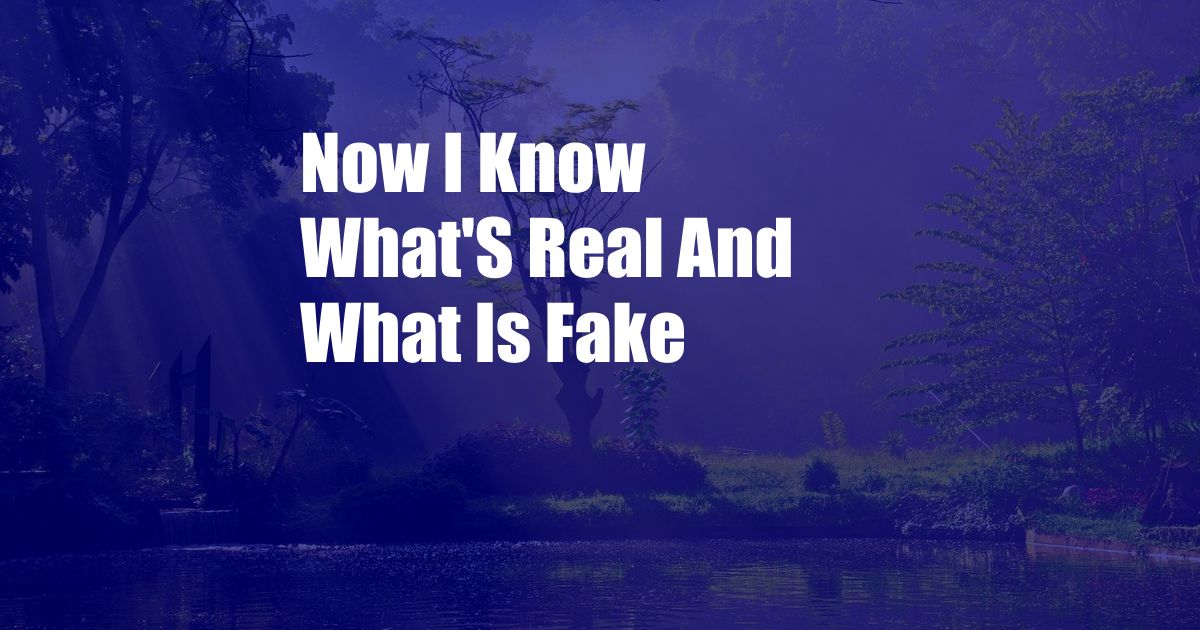
Now I Know What’s Real and What Is Fake
I’ve always been a bit of a skeptic. I don’t believe everything I hear or read, and I always try to get to the bottom of things. It’s not that I don’t trust people, it’s just that I’ve learned that not everything is as it seems.
One time, I was reading a news article about a new study that had found a link between eating chocolate and weight loss. I was excited because I love chocolate, and if it could aid in weight loss, that would be great. But then I started to think about it more critically. Why would eating chocolate help you lose weight? It didn’t seem to make sense.
So I did some more research, and I found that the study was funded by a chocolate company. That made me suspicious. I looked into the study more closely, and I found that the results were not as clear-cut as the news article had made them seem. The study had only been conducted on a small number of people, and the results were not statistically significant.
I was disappointed, but I was also glad that I had done my research. I had learned to be skeptical of what I read, and I had learned to get to the bottom of things.
Discerning Truth in the Digital Age
In today’s digital age, it’s more important than ever to be able to discern truth from falsehood. With so much information available online, it can be difficult to know what is real and what is fake.
There are a few things you can do to help you spot fake news and misleading information:
- Check the source. Who is publishing the information? Are they a reputable organization? Do they have a history of publishing accurate information?
- Consider the author. Who wrote the article? Do they have expertise in the subject matter? Are they biased in any way?
- Look for evidence. Does the article provide any evidence to support its claims? Are the sources credible? Is the evidence presented in a fair and unbiased way?
- Be skeptical. Don’t believe everything you read. If something seems too good to be true, it probably is.
Embracing Critical Thinking
The ability to think critically is essential for discerning truth from falsehood. Critical thinking involves the ability to:
- Identify and analyze arguments.
- Evaluate evidence.
- Draw conclusions.
- Communicate your findings.
Critical thinking is a skill that can be learned and developed through practice. There are a number of ways to improve your critical thinking skills, including:
- Taking courses in critical thinking.
- Reading books and articles about critical thinking.
- Practicing critical thinking skills in everyday life.
Tips for Spotting Fake News
Here are a few tips for spotting fake news:
- Look for headlines that are designed to grab your attention. These headlines often use sensational language and make outrageous claims.
- Be wary of articles that are shared by people you don’t know. These articles may be from unreliable sources.
- Check the date of the article. Fake news articles often use old or outdated information to make their claims seem more credible.
- Read the article carefully. Look for evidence to support the claims being made. If the evidence is weak or non-existent, the article is likely to be fake.
Expert Advice
Here is some expert advice on how to discern truth from falsehood:
- “The best way to combat fake news is to be informed.” – Michelle Obama
- “Critical thinking is the ability to think clearly and rationally about what to do or what to believe.” – Edward de Bono
- “Don’t believe everything you read.” – Mark Twain
FAQ
Q: What is the difference between fake news and misinformation?
A: Fake news is intentionally false or misleading information that is created and spread with the intention of deceiving people. Misinformation is false or inaccurate information that is spread unintentionally.
Q: What are some of the dangers of fake news?
A: Fake news can have a number of negative consequences, including:
- Misinforming the public.
- Undermining trust in institutions.
- Inciting violence.
Q: What can I do to combat fake news?
A: There are a number of things you can do to combat fake news, including:
- Educating yourself about fake news.
- Being critical of the information you consume.
- Sharing accurate information with others.
Conclusion
In today’s digital age, it is more important than ever to be able to discern truth from falsehood. By following the tips and advice in this article, you can develop the critical thinking skills you need to navigate the information landscape and make informed decisions.
Are you interested in learning more about discerning truth from falsehood? If so, there are a number of resources available online and in your local library.